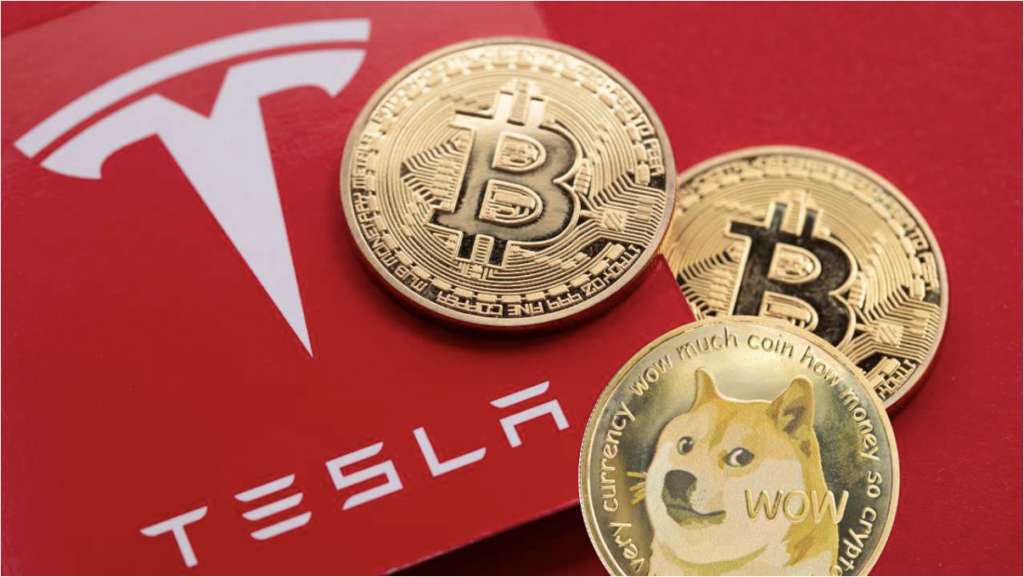Tesla announced its Q2 2022 earnings on Wednesday, but we learned more than just the company’s financials. The electric carmaker revealed some information about its crypto holdings, including a startling revelation: Tesla had sold off most of its Bitcoin holdings in Q2.
In Tesla’s latest earnings report, the company sold 75% of its Bitcoin holdings. The move comes after the volatile cryptocurrency plunged nearly 70% from an all-time high in Q2. It occurred in a market that saw a drop in share prices by more than 20%.
Tesla’s CEO, Elon Musk, was a big proponent of cryptocurrency. Early this year, he said he wouldn’t be selling his Bitcoins. While his private Bitcoin holdings differ from Tesla’s, he might have changed his mind entirely.
Last year, Musk made headlines when he tweeted he was considering investing in Bitcoin for Tesla. The company later bought $1.5 billion worth of BTC. Since then, Tesla has not made any further purchases. Musk further reiterated that Tesla, specifically, wouldn’t be selling its Bitcoin holdings.
But today, the reverse is the case. Therefore, the whole scenario pleads for insight even though the factors have been glaring. Here are genuine reasons we think influenced the sale of Tesla’s Bitcoin.

Bitcoin Impairment
According to Musk, one primary reason for selling off Tesla’s crypto holdings is Bitcoin impairment. If you’re not familiar with impairments, they represent the decline in a company’s assets after they’ve been purchased.
In other words, impairment is the difference between the price at which an asset was bought and its present value on your balance sheet. For example, let’s say Tesla buys 100 bitcoins at $1,000 each ($100,000), but now those same bitcoins are worth only half as much. Then it could record impairment losses of $50,000 — the difference between its cost basis ($100k) and current market value ($50k).
No doubt, Bitcoin affected Tesla’s profitability. The company had just $218 million remaining in Bitcoin on its balance sheet compared to $1.26 billion in Q1. A rough calculation implies Tesla lost around $162 million from its initial investment. This is enough reason to forgo its crypto investments, sticking to fiat money.
The Crypto Winter
The cryptocurrency market has been having a tough time over the past few months. The value of the cryptocurrency has slumped by about 70% this year. One Bitcoin now trades for less than $25,000 (worth less than over $60,000 on October 2021), and its value has plunged by more than 50% this year.
Tesla’s second-quarter profit fell 32% from record levels in the first quarter as the company spent heavily on producing its Model 3 electric car. However, it appears the dark periods are over for the electric carmaker.
With some analysts forecasting surges in demand for luxury vehicles amid the energy crisis in China and Europe, shares of Tesla rose after earnings were announced Wednesday. With the Bitcoin sale, Tesla made a net profit of about $2.26bn (£1.8bn).
Increased Production Costs
The lockdown in China disrupted Tesla’s supply chain, and it caused the firm to spend more money than expected. It also forced the carmaker to increase its production costs to meet sales targets for cars across Europe. Musk explained that selling these Bitcoins helped Tesla meet its unpredicted costs.
Musk further outlined that Tesla desperately needed new funds for its newly opened factories in Germany (Berlin) and the United States (Texas). He described both factories as ‘gigantic money furnaces.’
The sale also came when there was a need to reduce the dependence on Russian oil and gas. Therefore, Musk was right about how much money it would require to make renewable energy work in places that have been conversant with non-renewable. So it made sense from an economic perspective and a regulatory one for Tesla to sell its Bitcoin.
Bitcoin Energy Use
Tesla last year stopped accepting Bitcoin as payment for its cars, citing environmental concerns of Bitcoin. Bitcoin mining consumes roughly as much energy as the country of Denmark.
To secure a single transaction on the blockchain, miners have to solve complex mathematical problems. One mistake can render an entire block invalid and require all participants to start over again. This requires enormous computational power and energy use, which doesn’t say well of a company whose selling point is clean energy.
Thus, Tesla has been concerned about how energy-intensive Bitcoin mining is and wants to use more renewable power sources. The Bitcoin move could be the lasting answer to the company doing away with Bitcoin for good.
Demand for Fiat Currency
Tesla’s Bitcoin conversion to $936m (£782m) in fiat money is likely due to its baby boomer shareholders’ preference for traditional currency.
According to an analysis of Tesla owners’ demographics, most are old. Owners of Tesla’s Model S and X are 52 and 54, respectively, on average. It’s safe to say old folks like dollars, and Tesla understands this too well.
The baby boomer generation still holds onto some of their wealth in cash and checking accounts. In fact, many older people are wary of investing in cryptocurrency because they don’t trust digital assets due to their volatile nature and lack of regulation by government agencies.
